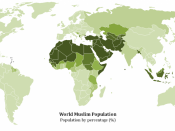This paper examines Huntington's "clash of civilizations" theory and tries to determine if religious differences between the Western world and the non-Western world, namely Islamic societies, cause major differences in political ideals. In the end, it looks like Islam and democracy to do not necessarily clash politically, but the Muslim world does have different feeling about "equality and hierarchy." The modernization theory explains why different societies have different values, and explains how it is possible for them to clash over social values.
In Huntington's clash of the civilizations thesis, his first of three main claims is that "culture matters" (Norris 135). Civilizations may differ in "history, language, ⦠tradition," and the way they believe different groups should interact (Huntington). He believes the most important difference between civilizations is religion, and that the ideals of each religion are deeply ingrained in their beliefs and actions (Huntington).
His second claim is that these differences in culture also cause a difference in the political beliefs of civilizations.
The two main civilizations that he seems to believe have the most differences are the Western Christian or secular societies compared with the every other civilization in the world, but particularly with Islamic societies. While most Western societies have a representative democracy, "most states in the Middle East and north Africa" that tried to have an electoral democracy failed (Norris 135). Huntington does not believe that Islamic society will agrees with or believe in all of the typical "Western ideas of individualism, liberalism, constitutionalism, human rights, ⦠democracy, free markets, [and] the separation of church and state" (Huntington). Instead, it is normally thought the Islamic cultures do not agree with democracy and would rather have a dictatorship ruled by religious leaders (Norris 136).
Lastly, Huntington believes that these differences in political beliefs that are...


